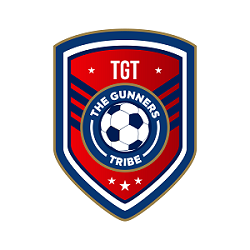Samir Nasri – where did it all go wrong? : Gunners
Really long article. Tried my best lol.
Part 1:
Samir Nasri was in a hospital for 12 days with viral meningitis, when he came to a significant conclusion.Rather than a stream of visitors and well-wishers, there had been a trickle. It opened his eyes to the superficiality of so many relationships, especially in football.
From that moment on, from the age of 20, if he felt something needed to be said, he would say it, and to hell with anyone who thought less of him for it. It allowed him to sleep at night.
There is regret, though. He finds himself drifting further and further from the illustrious stages that his mesmerising, precocious talent used to illuminate. From Marseille to Arsenal to City to Sevilla to Antalyaspor to West Ham United to Anderlecht and now, to a place called uncertainty.
If Nasri’s move to Belgium last summer, linking up with his former City team-mate Kompany, was greeted with considerable fanfare ,his departure on went unheralded. Long before Nasri’s contract expired, even before a dispute over his whereabouts at the start of lockdown, Anderlecht’s sporting director suggested signing him had been a mistake.
And so, while City and Arsenal prepare to face off in an FA Cup semi-final on Saturday, Nasri, who represented both clubs with distinction (at times at least), finds himself in limbo: between clubs, between jobs, awaiting his next challenge. “We’ll see what the future holds,” he said recently. Que sera sera. It would all seem quite reasonable enough, were it not for the enduring frustration that an enthralling, intriguing and certainly controversial career seems to be meandering towards an unsatisfactory conclusion.
“Samir has almost become the invisible man,” Philippe Auclair says. “If you mention him in France now, the reaction is along the lines of, ‘Of course. Samir Nasri. Where is he now? What happened to him?’ I would say there is a slight incomprehension about the path his career has taken, a feeling that this is an absolutely wondrous talent which has gone to waste over recent years. We’re talking about a player who is so gifted and so intelligent that it’s hard to understand why his career seems like an unfinished symphony.”
“We’re talking about a big, big talent,” Jose Anigo, who gave a 17-year-old Nasri his debut for Marseille, “He was something special. The problem with Samir is the character. I’m not saying he has a bad character — he’s a good guy — but it’s a strong character. He talks a lot. When he was 17, he would talk in the dressing room like a player who was 30. And sometimes for a footballer, it’s better not to talk.
“You might want to tell the truth, but sometimes telling the truth is not good for the career.”
March 9, 2010; London.
Arsenal were leading Porto 2-0 on the night, 3-2 up on aggregate, but the mood inside the Emirates was still tense in the 63rd minute, when Nasri received possession on the right wing. There were three opponents within 10 yards of him and Abou Diaby’s decoy run didn’t fool any of them. Nasri dribbled towards the corner flag, but Raul Meireles wasn’t giving him an inch, so he checked back again and this time he accelerated infield, caressing the ball with his right foot as he moved towards the corner of the penalty area.
At one point, there were three Porto players within an arm’s length of him. There didn’t seem any way for Nasri to do what he did next.
He surged away from Meireles, switching to his left and then back to his right as he weaved in and out of challenges from Cristian Rodriguez and Alvaro Pereira before moving decisively on to his right foot and slamming the ball past goalkeeper Helton and inside the far post. The whole sequence, from the moment he first moved infield, lasted about seven seconds.
“Just sensational,” said Andy Gray in the Sky Sports commentary box. “Absolutely sensational.”
It was a moment that summed up the audacity of the young Nasri, fleet of foot and even quicker of wit. Towards the end of that year, there were two sublime goals in a 2-1 victory over Fulham. The first saw him ghost into the penalty area and, with four deft touches, send Brede Hangeland and Aaron Hughes sliding past like a couple of hapless henchmen before he struck a left-footed shot into the net.
The second was, again, about keeping his composure and his footing when all around him were losing theirs. He wove around the challenges of Hughes, Dickson Etuhu and John Pantsil, dribbled past goalkeeper Mark Schwarzer, pirouetted back onto his right foot and, from a tight angle, swept the ball home.
“The goals were a combination of touch, intelligence, special talent and a calmness as well,” Arsene Wenger said after a win that took Arsenal to the top of the Premier League. “He needed to be patient to finish on both occasions and he did that well. When he came here, his game was based on coming onto the ball. Now he has more variations, makes runs without the ball and is, overall, more efficient. He was a bit too much attracted to the ball. Now he can use his pace — he has exceptional pace. I have always been a strong believer in him. Many people questioned me when I took him here, but he is showing he has exceptional talent. I think there is more to come from him.”
Later that month, Nasri was named French player of the year by France Football magazine. If anything, his surprising omission from the squad for that year’s World Cup finals — from which they were eliminated with just one point from three games amid such discord and dissent that four players were banned for a total of 27 matches by the French Football Federation (FFF) — worked in his favour, but ultimately it came down to his form for Arsenal both in the Champions League and the Premier League. He was named on the shortlist both the PFA Player of the Year and Young Player of the Year awards in 2010-11. Rio Ferdinand, the Manchester United defender, suggested Nasri would have been a worthy winner.
At the end of that campaign, which saw Arsenal finish empty-handed for a sixth consecutive season, Nasri spoke openly about his ambition to become the best player in the world.
“We already earn huge wages,” he said. “My priority is to make a big career and to win titles. I’m hungry for titles. I play football because I love this sport and want to feel the emotion of winning. With no titles under your belt, you can’t be in the list for the Ballon d’Or.”
Nobody at Arsenal held it against Cesc Fabregas when he rejoined Barcelona in the summer of 2011. He had arrived as a 16-year-old in the summer of 2003 and had been there for eight years. There was always the expectation that he would return to Catalonia one day and, if anything, Wenger was grateful he had given Arsenal one more year after Barcelona pushed so hard to sign him before the 2010 World Cup.
Nobody was quite so forgiving of Nasri’s move to Manchester City, though. He was the same age as Fabregas, 24, but he had only been there three years. He was not perceived to have served his time — even though time, ticking down on a contract that had just 12 months to run, was precisely what counted against Arsenal in this instance.
It all added up to a perception of a move fuelled by pure greed. That was certainly the feeling around the Emirates when Arsenal played Liverpool in their first home game of the 2011-12 Premier League season. Nasri was subjected to some unsavoury chants by Arsenal supporters but, over the course of the afternoon, their ire was redirected towards Stan Kroenke, the club’s American owner. “Spend some fucking money,” went a chant that would be repeated many times over the years that followed.
In difficult circumstances, Nasri played reasonably well and he left for City a few days later with Wenger’s reluctant blessing. In public, though, Wenger was scathing about Nasri’s career choice.
“Frankly, you don’t go to Manchester City to win titles,” he said. “Players go to Manchester City because they pay much better than Arsenal.”
It seemed an outdated slur. Arsenal were a better team than City when Kolo Toure and Emmanuel Adebayor moved north in the summer of 2009. Two years later, City finished above Arsenal in the Premier League while also winning the FA Cup. Arsenal were losing their best players. City were continually adding to a star-studded squad. For Nasri, the move was a no-brainer. As he said midway through that season, with City on course to win the title and Arsenal facing another battle for a top-four finish, “Look at the table.”




